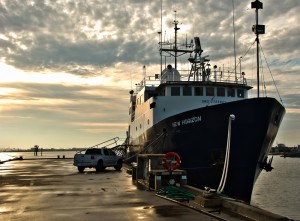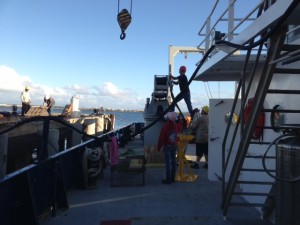As acting co-chief scientists, Jen Jackson and I finalized our cruise plan with Captain Ian and Liz Brenner. We were concerned that portions of our plan would be scrapped do to naval exercises and that we would have some serious regrouping to do. Of the two stations (sampling sites) that they were concerned about, we ended up pulling one due to anticipated rough water conditions, and the other station ended up being OK with Navy for the dates and times we were planning to be in the area. The remainder of the day was spent loading our gear onto the ship for departure – a process that was made possible through the herculean efforts of our resident technicians (restechs) Meghan and Robb, the crew of the New Horizon, and the Scripps dock crew. Thanks!
Category Archives: Uncategorized
Day 1 – Knowledge Transfer
 After a couple of days of traveling and our first night aboard the R/V New Horizon, the participants of the 2012 UNOLS Early Career Chief Scientist Training Cruise awoke in San Diego to begin their training in earnest. Most scientific cruises begin with a period of acclimation and orientation to the vessel, the crew and the objectives of the mission and this cruise was no different. Thus, our first breakfast in the mess was followed by quick introductions and a day of engaging lectures designed to familiarize the cruise participants with the UNOLS fleet.
After a couple of days of traveling and our first night aboard the R/V New Horizon, the participants of the 2012 UNOLS Early Career Chief Scientist Training Cruise awoke in San Diego to begin their training in earnest. Most scientific cruises begin with a period of acclimation and orientation to the vessel, the crew and the objectives of the mission and this cruise was no different. Thus, our first breakfast in the mess was followed by quick introductions and a day of engaging lectures designed to familiarize the cruise participants with the UNOLS fleet.
Jon Alberts and Lisa Levin gave an introduction to UNOLS and its fleet, which ranges from smaller in-shore vessels, to ice-breakers for polar research, to Global Class ships including Atlantis, the mothership of the deep water submersible Alvin. As a scientist who is just starting to write grant proposals for marine research, I was amazed not just by the breadth of capability offered by the UNOLS vessels, but also by the willingness and openness of the UNOLS staff to facilitate successful acquisition of time aboard them. It is comforting that even in the current climate of economic austerity, there remains a significant push to promote and encourage use of these resources to further human understanding of the natural world.
After a quick break for lunch, Resident Technician Meghan Donohue and Captain Ian Lawrence took us on a detailed tour of what is to be our home and laboratory for the next week. Normally, pre-cruise tours are primarily safety-oriented, so it was great to get an opportunity to see the engine rooms and learn about design considerations when building a new research vessel. After the tour we were assigned our lab space before more lectures on radioisotope usage aboard UNOLS vessels, how to avoid prison time for accidentally exporting US secrets, and the chemical analysis and oceanographic data support offered by the Oceanographic Data Facility here at the Scripps Institute. Jon then guided us through completing a Ship Time Request form as part of a proposal application before dinner.
To round off the day, David Checkley gave a great introduction to the oceanography of the California Current System, describing how this well-studied area is affected by upwelling, regions of anoxia and eddies and the effects of these phenomena on the spawning of important species such as sardines, anchovies, squid and hake. There is considerable data from the CalCOFI cruises running in this area since 1949 to suggest that the local oceanography is currently being affected by climate change. Finally, Clare Reimers closed proceedings with an overview of the role of Chief Scientists from proposals through to post-cruise debriefing.
After a long, but interesting day we were grateful for the opportunity to decompress at a local brew pup where our pub quiz team, The Geek Squad, came close to winning the trivia quiz before fatigue and a lack of sports and music knowledge took their toll. In the end, we finished fourth before retiring back to the New Horizon to get some much needed rest before tomorrow’s preparations for departure.
Posts coming…
The participants of the workshop will be posting here. Stay tuned! We’re less than a week away.

